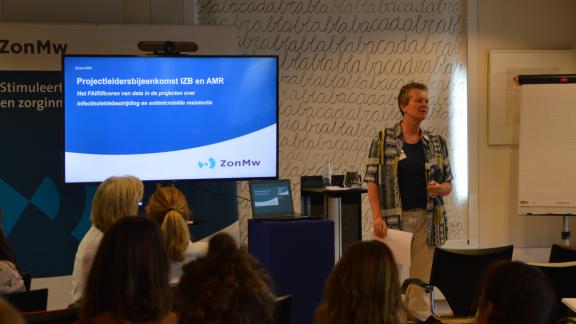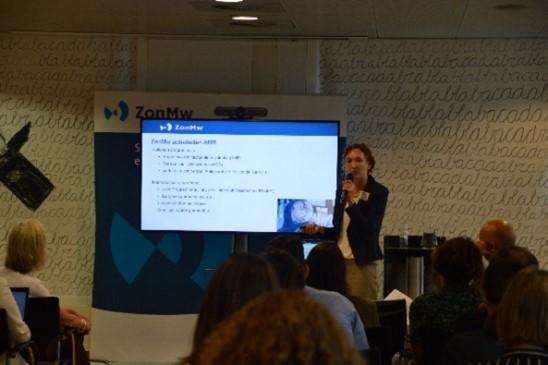Better (re)use of data

What is FAIR data?
FAIR is an acronym for Findable, Accessible, Interoperable & Reusable. If data are made FAIR according to the FAIR principles, they become findable, accessible, interoperable and reusable so that others can also make use of this data (under certain conditions). The data is only FAIR if computers also understand what the data are about and online tools and artificial intelligence can be used to analyse the data. That requires FAIR metadata that computers can also read. We therefore refer to this as metadata-for-machines (M4M). ZonMw develops M4M metadata schemes for its programmes together with researchers and data stewards in a given research domain. The FAIR principles are explained in more detail in an interactive video on our website.
Watch our video about making project data FAIR (Dutch):
Why does ZonMw encourage making research data FAIR?
Data form the raw material for knowledge creation in ZonMw projects. Data – as equally the publications from a project – are the form in which knowledge is recorded (safeguarded) and spread. By making data reusable, you can use it to verify research results, do new research or provide evidence for policy. Data management is needed to make data reusable, which should be done as much as possible according to the FAIR principles. The ultimate goal is that data files from ZonMw projects contribute to the quality of research and knowledge development and innovation in the area of health and care.
FAIR data and the ZonMw programs antibiotic resistance and infectious disease control
An important aspect of making data FAIR is that a researcher produces FAIR metadata about the data. With FAIR metadata you obtain a standardised description of the data, which makes use of controlled terms that the computer can read (metadata-for-machines, M4M).
For the themes infectious disease control and antibiotic resistance ZonMw, together with the GO FAIR Foundation and Health-RI, has organised workshops for researchers and data stewards to establish which themes terms must be used for a FAIR/M4M metadata scheme that is appropriate for the domain of infectious diseases and antibiotic resistance. The Infectious Disease Control (IDC) and Antibiotic Resistance (ABR) programmes can now make use of the metadata schemes in the forthcoming funding rounds. The information based on the metadata will become available on the data portal of Health-RI, which is now being made suitable for information other than just COVID-19 (see the presentation from Rita Azevedo).
Within the third funding round of the Antibiotic Resistance programme, FAIR data plays an important role. In 8 projects about FAIR data and antibiotic resistance, the research only makes use of existing data and the researchers and their data stewards work on improving the data. They have also used the FAIR/M4M metadata schemes to make these data more FAIR.
During an interview round, the researchers from the ABR programme were asked about their experiences with making the data FAIR. They could see the importance of making data FAIR and are positive about this. FAIR data can make it possible to answer new questions with existing data. However, the researchers still find it difficult to make data FAIR because it is time-consuming and it is not always clear which methods they should choose. Data stewards can help in this process because they can take care of 'the translation' of which data the researcher has and what is required to make the data FAIR. In addition, the researchers were satisfied with the support and supervision from ZonMw.
The presentations from the speakers at the meeting

The meeting was hosted by Merik Seven and Monique van der Hoeven. Merik is director of programmes and ZonMw. Monique is cluster header of the cluster Health Protection that the programmes Antibiotic Resistance and Infectious Disease Control fall under.
During the meeting, eight speakers gave a presentation:

Margreet Bloemers and Ayla Hesp van ZonMw, Mijke Jetten from Health-RI /DTL, Rita Azevedo from Health-RI / Lygature, Barend Mons from GO FAIR Foundation / LUMC, Erik Schultes from GO FAIR Foundation, Jeroen Belien from Health-RI / AUMC / VU Amsterdam and Mirjam van Reisen from LUMC.
The participants had the opportunity to pose questions to the speakers and they could also ask each other questions.
Margreet Bloemers of ZonMw
Margreet coordinates FAIR data & data management at ZonMw. During her presentation, she talked about the application of data management in ZonMw projects for reusable data, the steps towards FAIR data, the use of FAIR data in the IDC & ABR research field, and the programme for this project leaders meeting.
> Watch the presentation of Margreet Bloemers
Mijke Jetten of Health-RI/DTL
Mijke is community manager (FAIR) Data Stewardship and gave a presentation about supporting community building for researchers and data stewards.
> Watch the presentation of Mijke Jetten
Ayla Hesp of ZonMw

Ayla is programme manager of the programmes Antibiotic Resistance and JPIAMR at ZonMw. During her presentation, she talked about the last funding round for antibiotic resistance in which the use of existing data took centre stage.
> Watch the presentation of Ayla Hesp
Rita Azevedo of Health-RI/Lygature

Rita is senior programme manager Health-RI Action Line III. During the workshop, she gave a demonstration about human-readable metadata on the Health-RI (COVID-19) data portal.
> Watch the presentation of Rita Azevedo
Barend Mons of GO FAIR Foundation, LUMC

Barend is Professor of Biosemantics at LUMC and scientific director of the GO FAIR Foundation. He talked about how you can do research with FAIR data.
Erik Schultes of GO FAIR Foundation

Erik is FAIR Implementation Lead. During his presentation, he showed which concepts and tools there are to create FAIR data.
Jeroen Belien of Health-RI / AUMC / VU

Jeroen is associate professor at AUMC. During his presentation talked about the findability of FAIR data by people and machines.
Mirjam van Reisen of LUMC

Mirjam is Professor of FAIR Data Science at LUMC. She talked about the project VODAN Africa, which concerns the application of FAIR data in Africa. The chair of the Virus Outbreak Data Network Africa, Dr Mouhammad Mpezamihigo, was also present during the meeting.
> Watch the presentation of Mirjam van Reisen

